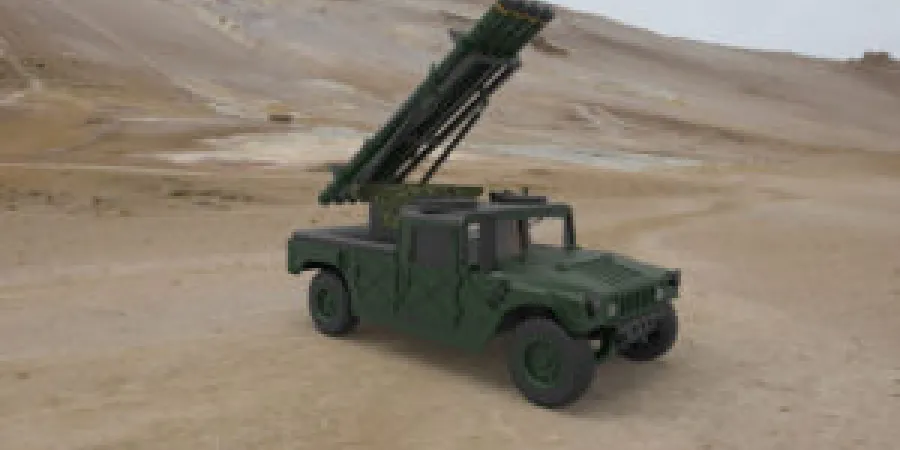IMI Systems introduces C-LYNX Lightweight Multiple Rocket Launcher System
The C-LYNX is a designated lightweight dedicated launcher capable of carrying up to eight ACCULAR 12 rockets and can be delivered by a C-130 (Hercules) or similar aircraft
IsraelDefense
|
23/05/2017
IMI Systems recently presented for the first time an innovative new rocket system for Special Forces, based on the first of its kind ACCULAR precision rocket and designed to assist forces in urban warfare and neutralize targets in ranges up to 35 km.
Developed at the IMI Systems Givon plant, the new system joins other precision rockets systems developed and manufactured by the company for ranges from 40 km to 300 km, including the Extra rocket for the range of 150 km and the Predator Hawk rocket for the range of 300km.
The new rocket system was developed in response to Special Forces who may operate in high-risk locations which are beyond the range of traditional artillery fire support, hence usually need to carry out their missions without any significant and sufficient fire assistance.
The ACCULAR 12 is 122mm caliber rocket is equipped with a 20kg of penetration or controlled fragmentation warhead.
The C-LYNX is a designated lightweight dedicated launcher capable of carrying up to 8 ACCULAR 12 rockets and can be delivered by a C-130 (Hercules) or similar aircraft. Designed to be used by Special Forces, the system provides accurate and effective fire support to the entire forces’ line of operation.
Equipped with advanced navigation and C2 systems the C-LYNX launcher operates completely autonomously and can provide fire response immediately according to the combat forces requirements.
The ACCULAR was designed to support ground forces and neutralize targets in areas where traditional artillery is limited by the accuracy and long range missiles are not cost-effective. This accurate rocket is equipped with advanced warheads, either controlled fragmentation or for penetration, and offers an accuracy of less than 10m CEP.
[Source: Army Recognition]
The C-LYNX is a designated lightweight dedicated launcher capable of carrying up to eight ACCULAR 12 rockets and can be delivered by a C-130 (Hercules) or similar aircraft
IMI Systems recently presented for the first time an innovative new rocket system for Special Forces, based on the first of its kind ACCULAR precision rocket and designed to assist forces in urban warfare and neutralize targets in ranges up to 35 km.
Developed at the IMI Systems Givon plant, the new system joins other precision rockets systems developed and manufactured by the company for ranges from 40 km to 300 km, including the Extra rocket for the range of 150 km and the Predator Hawk rocket for the range of 300km.
The new rocket system was developed in response to Special Forces who may operate in high-risk locations which are beyond the range of traditional artillery fire support, hence usually need to carry out their missions without any significant and sufficient fire assistance.
The ACCULAR 12 is 122mm caliber rocket is equipped with a 20kg of penetration or controlled fragmentation warhead.
The C-LYNX is a designated lightweight dedicated launcher capable of carrying up to 8 ACCULAR 12 rockets and can be delivered by a C-130 (Hercules) or similar aircraft. Designed to be used by Special Forces, the system provides accurate and effective fire support to the entire forces’ line of operation.
Equipped with advanced navigation and C2 systems the C-LYNX launcher operates completely autonomously and can provide fire response immediately according to the combat forces requirements.
The ACCULAR was designed to support ground forces and neutralize targets in areas where traditional artillery is limited by the accuracy and long range missiles are not cost-effective. This accurate rocket is equipped with advanced warheads, either controlled fragmentation or for penetration, and offers an accuracy of less than 10m CEP.
[Source: Army Recognition]



